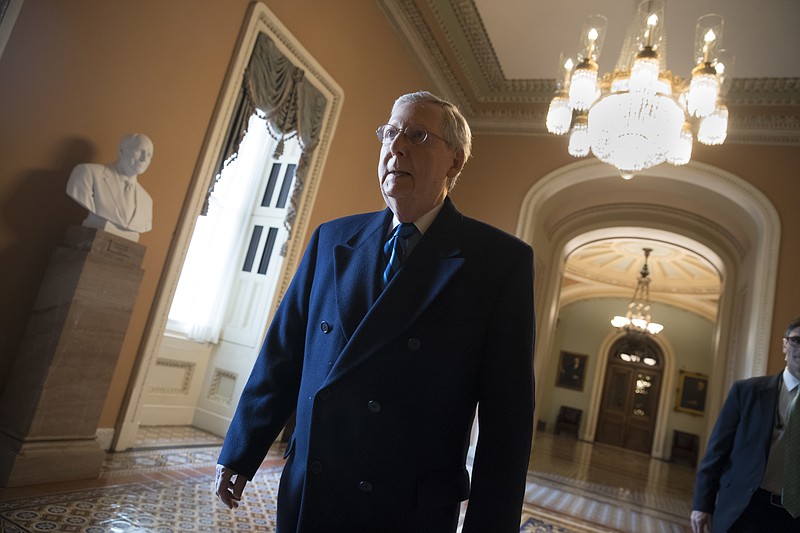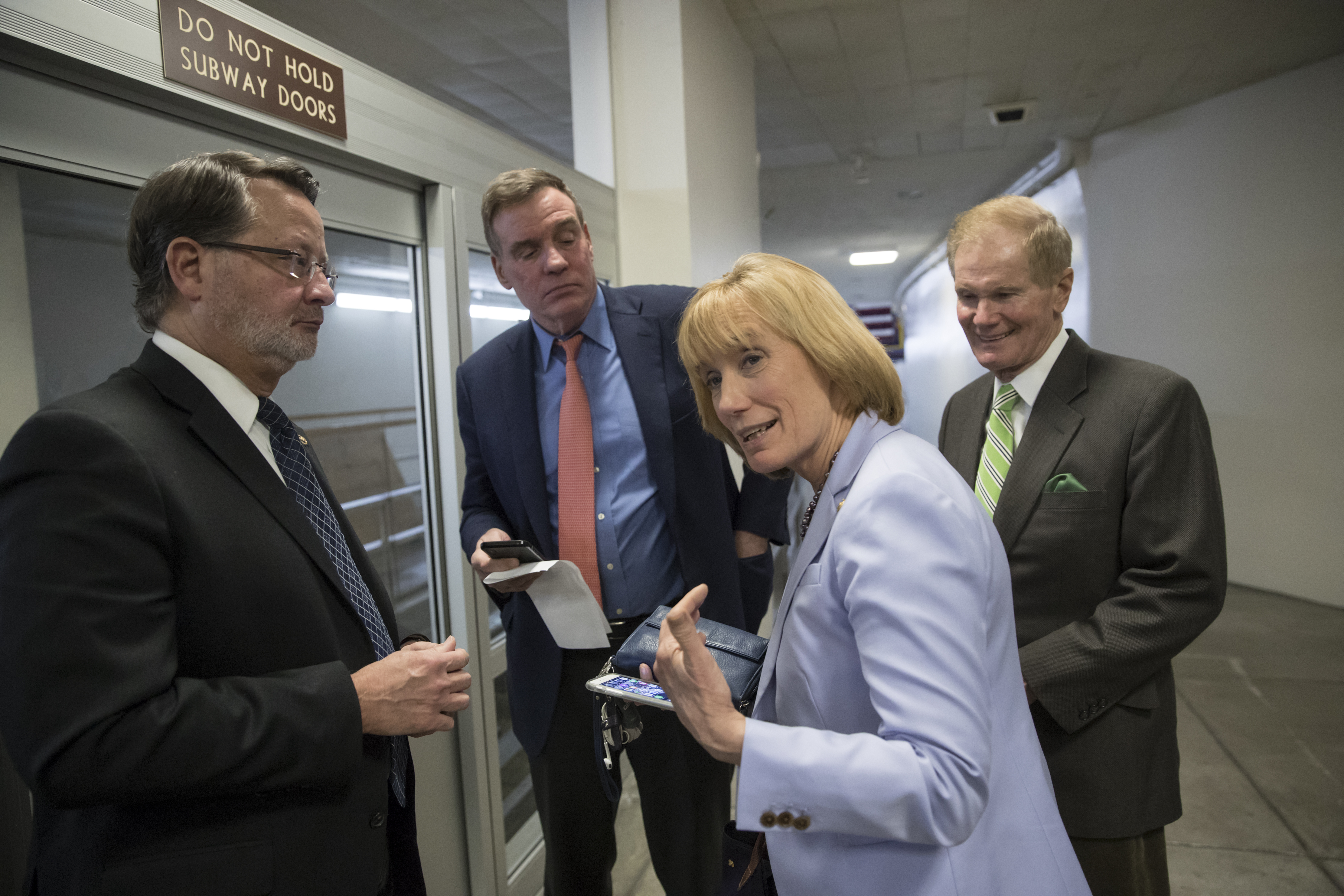WASHINGTON (AP) - The government shutdown is set to sow more disruption and political peril Monday after the Senate inched closer but ultimately fell short of an agreement that would have reopened federal agencies before the beginning of the workweek.
Senate Majority Leader Mitch McConnell and Democratic leader Chuck Schumer said negotiations were still underway late into the night, with a vote to break a Democratic filibuster on a short-term funding bill scheduled for noon Monday. Under the proposal taking shape, Democrats would agree to a three-week spending measure - until Feb. 8 - in return for a commitment from the Republican leadership in the Senate to address immigration policy and other pressing legislative matters in the coming weeks.
But Democrats appeared to be holding out for a firmer commitment from McConnell. "We have yet to reach an agreement on a path forward," Schumer said late Sunday.
McConnell's comments followed hours of behind-the-scenes talks between the leaders and rank-and-file lawmakers over how to end the display of legislative dysfunction, which began Friday at midnight after Democrats blocked a temporary spending measure. Democrats have sought to use the spending bill to win concessions, including protections for roughly 700,000 younger immigrants brought illegally to the U.S. as children.
Local reactions
"I cannot fathom how Senate Democrats, knowing the severity of the issues in question, acted with such insensitivity using our children and our military as pawns, putting party over country. Due to their decision, our service members and country will suffer tremendously. Furthermore, about 9 million children risk being kicked off health insurance impacting over 70,000 children in Tennessee alone. I stand ready to work tirelessly to reopen our government and put our country back on the path forward."- U.S. Rep. Chuck Fleischmann, R-Tenn."Tennesseans elected me to make the government work for taxpayers, not to shut it down. We are close to agreement on legislation to increase military spending, extend the children's health insurance program, lower insurance rates for self-employed people, provide disaster relief and begin to deal with immigration issues. Democrats are voting to shut down the government; I'm voting to keep it open and solve problems. There is no excuse whatsoever for shutting down the government."- U.S. Sen. Lamar Alexander, R-Tenn."This shutdown is absurd and it's the direct result of the out-of-control partisanship that is killing our country. Congress needs to get back to basics and there are few things more basic for our well-paid Congress to do than to pass a budget and keep our country's doors open."- Phil Bredesen, Democratic candidate for Tennessee governor"Democrats are holding the entire government hostage for a completely unrelated issue that doesn't have an immediate deadline – DACA. There have been high-level negotiations over illegal immigration and border security for months. There's just not an agreement yet. The bottom line: few people understand why Democrats want to disrupt life for Americans, put national security at risk and put sick children at risk over illegal immigration. There's no pressing deadline and no reason for them to abandon talks."- U.S. Rep. Tom Graves, R-Ga."Last night, the Democratic minority in the Senate shut down the government. That is not how Congress is supposed to work. The voters elected a Republican President and Republican majorities in both houses of Congress to get things done. While the House has listened to the American people and passed numerous pieces of major legislation, the Senate has failed to follow suit, largely due to arcane Senate rules. It's time to let the majority govern. It's time for Mitch McConnell to scrap the Senate rules that give Chuck Schumer the power to stop the congressional agenda in its tracks."- U.S. Rep. Diane Black, R-Tenn."It is popular to criticize government, and to pretend that we don't need it. But we are the greatest nation on earth because of our people and, also, partly because of our government, so it is a tragic mistake to harm either. Senate Republicans and Democrats should compromise with each other fast before any more damage is done to the country. Then the House should pass what the Senate passes. There are plenty of existing compromises."- U.S. Rep. Jim Cooper, D-Tenn.
Republicans have appeared increasingly confident that Democrats were bearing the brunt of criticism for the shutdown and that they would ultimately buckle. The White House and GOP leaders said they would not negotiate with Democrats on immigration until the government is reopened.
There were indications Sunday that Democratic resolve was beginning to waver, with growing worries that a prolonged shutdown could prove to be an electoral headache for the party just as it has grown more confident about prospects in November. Although they initially dug in on a demand for an immigration deal, Democrats had shifted to blaming the shutdown on the incompetence of Republicans and President Donald Trump.
Trump, who regularly disrupted negotiations in recent weeks, had been a relatively subdued player in the weekend debate. He has not appeared in public since Friday afternoon. The White House said he was in regular contact with Republican leaders, but he has not reached out to any Democrats, a White House official said.
Sunday morning on Twitter, he called on the GOP-controlled Senate to consider deploying the "nuclear option" - changing Senate rules to end the filibuster - and reopen the government with a simple majority.
McConnell has dismissed that option, saying Republicans will welcome the filibuster when they return to being the Senate minority. The White House didn't immediately respond to McConnell's comments.
Democrats are facing intense pressure from their base to solve the issue over the young immigrants, and they are skeptical of Republicans' credibility when offering to take up the issue. Whether Trump would back the emerging plan or any later proposal on immigration is an open question. Even if the Senate voted on an immigration proposal, its prospects in the House would be grim.
Throughout the day there were few outward signs of progress, as lawmakers took turns delivering animated speeches to near empty chambers to explain why the other party is to blame. McConnell and Schumer met off the Senate floor in the early evening, as many in quiet Capitol offices flipped their television screens to playoff football games.
While lawmakers feuded, signs of the shutdown were evident at national parks and in some federal agencies. Social Security and most other safety-net programs were unaffected by the lapse in federal spending authority. Critical government functions continued, with uniformed service members, health inspectors and law enforcement officers set to work without pay.
Lawmakers were mindful that the political stakes would soar Monday morning, when thousands of federal workers would be told to stay home or, in many cases, work without pay. What was still a weekend burst of Washington dysfunction could spiral into a broader crisis with political consequences in November's midterm elections.
That threat prompted a bipartisan group of Senate moderates to huddle for a second day Sunday in hopes of crafting a plan to reopen the government. The group was set to meet again Monday morning.
The emerging approach found advocates in South Carolina Sen. Lindsey Graham, who has been trying to broker an immigration deal, and Kentucky Sen. Rand Paul, both Republicans who rejected an earlier short-term proposal. Arizona Sen. Jeff Flake, another previous no-vote, announced he would vote in favor of reopening the government Monday.
Graham said no deal had been reached by the moderate group because Democrats were not yet on board. "To my Democratic friends, don't overplay your hand," he told reporters. "A government shutdown is not a good way to get an outcome legislatively."
The vote Monday will prove to be a test of unity and resolve among Democrats. Five Democrats from states won by Trump broke ranks in a vote Friday. The measure gained 50 votes to proceed to 49 against, but 60 were needed to break a Democratic filibuster.

